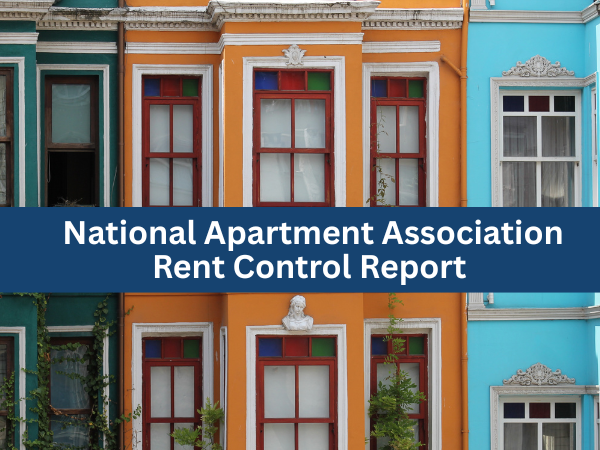National Apartment Association Rent Control Report
National Apartment Association Rent Control Report
Rent Control Outlook: Spring 2025
By Emily Howard, National Apartment Association

State legislatures and city councils continue to pursue failed policies that would regulate rents and rent increases, with one jurisdiction managing the ongoing fallout from strict rent controls passed in 2021.
The National Apartment Association (NAA) is currently tracking 172 rent control bills and supporting our affiliate partners’ efforts to stop bad policy from advancing.
Washington State
Despite the Washington Multifamily Housing Association’s (WMFHA) robust advocacy efforts, Governor Ferguson has signed a statewide rent control bill into law. Washington becomes the third state to impose rent control statewide in addition to Washington, D.C. Washington State’s House Bill 1217 limits rent increases to 7% plus CPI or 10% - whichever is lower – with rents for mobile or manufactured homes capped at 5% annually. Additionally, the bill prohibits rent increases during the first year of a lease and mandates that landlords provide tenants with notice 90 days prior to applying a rent increase.
Other Proposed Statewide Caps Fail
As more and more state legislatures adjourn “sine die” this legislative season, avenues are closing for proponents to advance additional rent control policies across the country. This year, a dozen rent control bills were introduced in Massachusetts alone, ranging from “rent control lite” proposals that limit cap rents for vulnerable populations—such as seniors, low-income renters residing in affordable housing units or manufactured home residents—to enabling legislation that would open the floodgates to local rent controls. All forms of rent control being considered in the Massachusetts legislature would be extremely damaging to the Bay State’s renters and housing providers alike.
Legislation in Texas (House Bill 2904) would restrict rent increases in affordable housing, while Pennsylvania (SB546) would create statewide rent limits at a maximum of 10%. Other states have new measures aiming to cap rents for mobile and manufactured homes, such as Illinois (House Bill 3526) which would limit rent increases to 3%.
Some previously reported bills have also seen updates:
-
Connecticut (House Bill 5428, Senate Bill 991) - Tabled on the House Calendar.
-
Florida (Senate Bill 382) - Indefinitely postponed and withdrawn from consideration.
-
New York (Senate Bill 228) – Ordered to Third Reading.
-
Rhode Island (House Bills 5264 and 5676) – Committee recommended measure be held for further study.
Some Positive Movement
The St. Paul, Minn. City Council continues to deal with the fallout from their strict rent control policies that imposed a 3% cap on annual rent increases, which have been effective since 2022. Despite some rollbacks, 80% fewer housing units were built in St. Paul in 2024 compared to the previous three-year average, according to a MinnPost analysis. On May 3, 2025, the City Council further expanded the new construction exemption for the city’s rent control ordinance to properties built after 2004. On May 21, 2025, the Mayor signed the ordinance exempting "rental property that were issued their first building certificate of occupancy after December 31, 2004."
The Salinas, California City Council has voted to repeal the city's rent stabilization, just cause eviction and rental registration policies. With the repeal, Salinas will rely on California’s statewide tenant protection laws, which include limited rent caps and restrictions on eviction.
In Nebraska, Governor Pillen has recently signed into law a statewide preemption bill (Legislature Bill 266), that would prohibit localities from imposing these damaging policies. The passage of this bill reflects a positive, collaborative effort from the Apartment Association of Nebraska and multiple groups aimed at ensuring affordable housing and effective business practices.
Rent Control Legislation
This wave of rent control legislation is based on the misconception that regulating rents will improve the cost of living for renters. However, research indicates that rent control does more harm than good. Rent caps fail to account for rising operational costs for housing providers and the need to plan for capital expenditures throughout the property's useful life. This ultimately affects both the quality and quantity of rental communities in rent-controlled jurisdictions, to the detriment of renters.
The National Apartment Association will continue its federal advocacy and support its affiliate partners’ efforts to oppose all forms of rent control. To address rising housing costs, we urge lawmakers to focus on the undersupply crisis and tackle the regulatory barriers that increase costs to develop, own and operate rental housing and ultimately, impact renters.
This article was reprinted with permission of the National Apartment Association. For more information, go to www.naahq.org.
